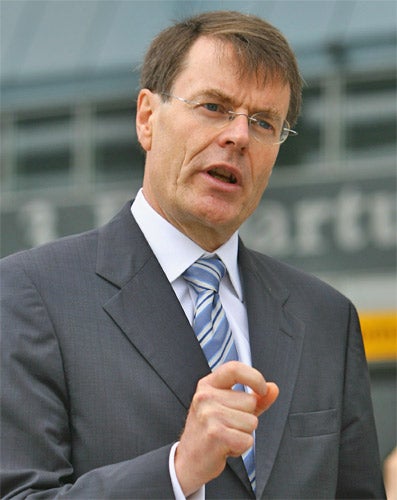BAA bemoans high tariffs as passengers rise

Your support helps us to tell the story
From reproductive rights to climate change to Big Tech, The Independent is on the ground when the story is developing. Whether it's investigating the financials of Elon Musk's pro-Trump PAC or producing our latest documentary, 'The A Word', which shines a light on the American women fighting for reproductive rights, we know how important it is to parse out the facts from the messaging.
At such a critical moment in US history, we need reporters on the ground. Your donation allows us to keep sending journalists to speak to both sides of the story.
The Independent is trusted by Americans across the entire political spectrum. And unlike many other quality news outlets, we choose not to lock Americans out of our reporting and analysis with paywalls. We believe quality journalism should be available to everyone, paid for by those who can afford it.
Your support makes all the difference.BAA reported a rise in third-quarter traffic yesterday, but the airports operator still bemoaned "high tariffs" imposed on its business.
Colin Matthews, chief executive, argued that while passenger numbers are on the rise they are still sharply below the level of use that regulators were predicting when the charges were originally set.
"Passenger numbers for this year are way below what the regulator thought when it was setting our tariffs," he said. "Life remains tough for us, as it does for the industry as a whole."
BAA, which is majority-owned by the Spanish infrastructure group Ferrovial, said it was relying on business travel between Britain and booming markets elsewhere in the world to make up for families reining in spending on flights abroad as a result of the impact of government cutbacks and tax rises, which are set to eat into disposable incomes.
Traffic picked up at Heathrow in the third quarter, which included the airport's busiest day ever on 18 July. Growth accelerated to 4.4 per cent on an underlying basis, from 2.3 per cent in the first half. This was driven by business flights to emerging markets, as well as European financial centres.
But Stansted, which serves mainly non-business passengers, suffered a sharp tail-off. Falls in traffic had been easing, but activity fell 6 per cent in the third quarter, compared with 3.1 per cent in the second.
Mr Matthews said: "Stansted is more [interlinked] with the UK economy and short haul and it is more sensitive to the amount of money people have in their pockets or that they imagine they will have after the Government's spending cuts."
Mr Matthews said he believed international agreement would be reached on the contentious issue of security checks imposed by American airports, but he said that he believed it would take some time.
"Ideally we would have the same requirements across Europe and the same experience at the other end across the Atlantic," Mr Matthews said. "There are aspects where we do things that are a bit clumsy. There has been a lot of comment about making passengers take shoes off and it is perfectly true that, for some passengers, taking shoes off is difficult to do and uncomfortable."
The BAA chief's comments echo those made by British Airways' chairman, Martin Broughton, who attacked the US for imposing unnecessary measures on other countries when it does not enforce them at home.
Mr Matthews said discussions were under way and that he was optimistic.
BAA's pre-tax loss for the nine months to the end of September narrowed by 75 per cent to £192.6m.
Join our commenting forum
Join thought-provoking conversations, follow other Independent readers and see their replies
Comments